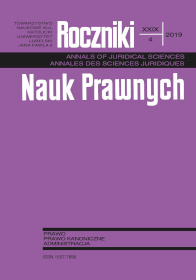The Contribution of Bishops from the Communist States to the Doctrine of the Second Vatican Council in Respect of Church–State Relations
The Contribution of Bishops from the Communist States to the Doctrine of the Second Vatican Council in Respect of Church–State Relations
Author(s): Anna SłowikowskaSubject(s): Law, Constitution, Jurisprudence, Canon Law / Church Law
Published by: Towarzystwo Naukowe KUL & Katolicki Uniwersytet Lubelski Jana Pawła II
Keywords: Communism; Church-State Relations; the Second Vatican Council
Summary/Abstract: The relations between the Church and the State have always been a delicate and complex issue. Its importance and complexity is reflected by the fact that while the Vatican II was improving and developing its modern doctrine on the ecclesiastical and the political community, no separate document to address this issue was being projected. However, ultimately two such documents were created: the Declaration on Religious Freedom Dignitatis Humanae and the Pastoral Constitution on the Church in the Modern World Gaudium et spes.The article presents the contribution of bishops from the Communist Bloc states to the teaching of Vatican II regarding Church–State relations. When addressing these relations, the Council limited itself to having speeches and written remarks (animadversiones) delivered only by the bishopsrepresentatives of the Communist Bloc, and this perspective has relevance for the presented study. In those states where a system based on a totalitarian regime was in use, any traces of religious life would be eliminated from social life, and combating the Church was a priory for the state authorities. For this reason, the bishops who exercised their daily ministry in communist countries, were supposed to show to make other bishops aware of the real problems facing the Church, using their own experience. Their involvement and voice were consistent with the assumptions of the Council, which were realised as part of aggiornamento, highlighting the modernisation, revival and adjustment of the Church’s activity to changes taking place in the modern world. The outcomes of these bishops’ efforts were, among others: the affirmation of human dignity as the source of religious freedom, which was reserved to every human being, the observation that this freedom is our freedom from coercion to do things contrary with our conscience, the highlighting of parents’ right to educate their children in the faith, the recognition of the pluralism of world views as well as pluralistic society, which requires a model of its relations with the Church, the consideration of mutual independence of the Church and the political community and the need for cooperation, and the observation that Christians have duties both as Church members and citizens of the State.
Journal: Roczniki Nauk Prawnych
- Issue Year: 29/2019
- Issue No: 4
- Page Range: 173-199
- Page Count: 27
- Language: English

